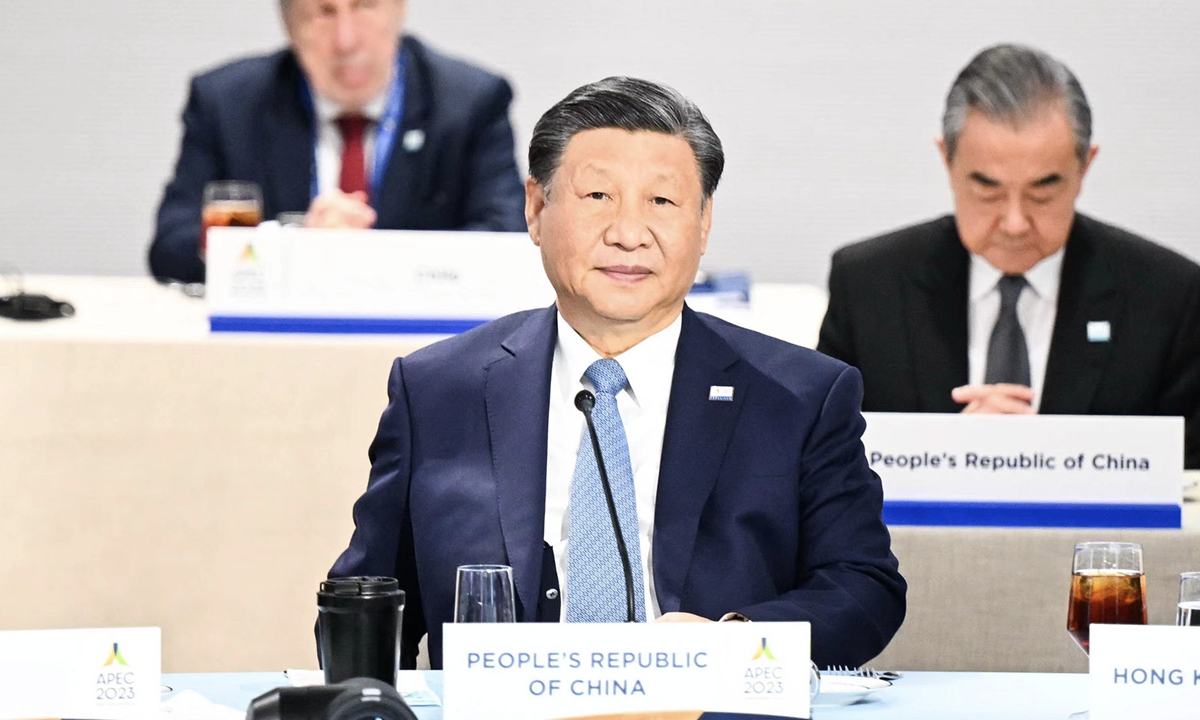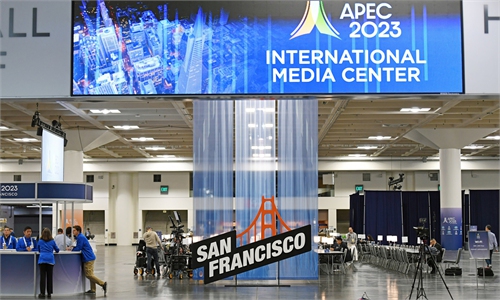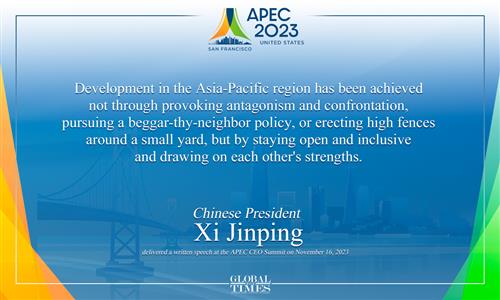Xi's APEC speech embodies Asia-Pacific region's common expectations for cooperation instead of confrontation

Chinese President Xi Jinping attends APEC Leaders' Informal Dialogue with Guests and working lunch in San Francisco, US, on November 16 (local time). Photo: Xinhua
Chinese President Xi Jinping delivered a written speech to the Asia-Pacific Economic Cooperation (APEC) CEO Summit in San Francisco on Thursday (local time), during which he called for staying committed to APEC's "founding mission" that emphasizes openness, inclusiveness, development for all and seeking common ground while shelving differences. He stressed that the Asia-Pacific cannot and should not be an arena for geopolitical rivalry, and still less should it be plunged into a new Cold War or camp-based confrontation.
In the speech, Xi also affirmed China's unswerving push for further high-level opening-up and the country's confidence and capacity for achieving long-term and stable economic growth. "The 'next China' is still China," he said, highlighting that the country has become a synonym of the best investment destination, and through development, China will continue to provide the world with new growth momentum and opportunities.
Observers said Xi's speech, which recalled the founding mission of APEC at the leaders' meeting mechanism's 30th anniversary, embodies Asia-Pacific countries' common expectations for open, inclusive regional cooperation rather than being coerced into small cliques by certain Western hegemonic powers, at a time when multiple geopolitical-driven barriers are blocking trade, investment liberalization and supply chain integration.
It is also a vivid display of Chinese wisdom that is set to galvanize collaborative efforts, inject more certainty into a world full of rising uncertainties, and transform the Asia-Pacific region - which accounts for over 60 percent of global GDP and nearly half of global trade - into a more dynamic growth engine, analysts said.
China's economic blueprint has been drawing widespread attention from participating entrepreneurs. They stand firm that China's ongoing opening-up and its promising economic outlook will continue to make it a core driver of the Asia-Pacific economy, while unleashing more room for regional cooperation in such sectors as climate change, green economy, and digital transformation.
A return to APEC's 'founding mission'
Noting that the world has entered a new period of turbulence and change, Xi stressed at the speech that we should stay committed to APEC's founding mission, and move to re-launch Asia-Pacific cooperation.
"The story of Asia-Pacific prosperity and development shows that development is only possible with cooperation, absence of cooperation is the biggest risk, and that decoupling and supply-chain disruption are not in anyone's interests," Xi said.
Xi also underscored that we should remain committed to open regionalism, and steadfastly advance the building of a Free Trade Area of the Asia-Pacific, make our economies more interconnected, and build an open Asia-Pacific economy featuring win-win cooperation.
Fernando Reyes Matta, former Chilean Ambassador to China and director at the Center for China Studies at Andrés Bello University, told the Global Times that the APEC meetings took place at a time when the global economy is showing many problems. As such, the strength of some voices such as China and Chile is important for advocating for free trade and a world without barriers and protectionism.
It sends a clear message to actively promote free trade and investments based on multilateral trade rules, and establish a higher level of economic integration in the Asia-Pacific region, Li Yong, a senior research fellow at the China Association of International Trade, told the Global Times on Friday.
The Chilean former diplomat said that it is absurd to believe that policies of confrontation and creation of blocs against China such as those promoted by Washington in recent years provide a good future. "The reality in the Asia-Pacific is not black and white, nor can it be. It is a space for dialogue for the rich diversity that comprises it," he said.
Xi also said that ten years ago, he called for building a community with a shared future for mankind. "The APEC Putrajaya Vision explicitly lays out its vision for an Asia-Pacific community by 2040, charting the course for further cooperation in our region," he noted.
Song Guoyou, deputy director of the Center for American Studies at Fudan University, told the Global Times that China's wisdom and solutions to global challenges are very forward-looking, and will also help establish fairer, more transparent, safer and peaceful governance that is in line with regional expectations. This is in contrast to the Western hegemonic approach that drives wedges and instigates confrontation out of a Cold War mentality.
On Wednesday local time, a much-anticipated China-US summit meeting concluded, in which the leaders of the world's two largest economies set the direction for a healthy, stable, and sustainable development of bilateral relations. On Thursday, Xi also met with Japanese Prime Minister Fumio Kishida in San Francisco, a sign that Asia's two largest economies are working to properly handle disputes.
"Given that China is one of the largest APEC economies and one of the most important growth drivers among APEC economies, its active engagement in the APEC mechanism is already an anchor for global development. Moreover, China's exchanges with other major APEC economies show the country's constructive role in managing differences, which will channel stability to the Asia-Pacific and the entire world," Song said.
It also sends resounding signals that serve as both an investment reference and an assurance for global companies looking to extend their outreach in the Asia-Pacific region, company representatives noted.
"Of course, what we sincerely hope for is that geopolitical tensions do not continue to worsen; ideally, they might even move in a positive direction. This would allow us to focus more calmly and work within a conducive business environment to contribute more to our planet," Li Zhenguo, President of LONGi Green Energy Technology Co, one of China's largest manufacturers of solar wafers and modules, told the Global Times.
Pivotal role in APEC
In the speech, Xi also voiced great confidence in China's economic prospects. This year, China's economy has been steadily recovering and turning for the better. Its growth rate is among the highest among major economies of the world… China remains the most powerful engine of global growth, and will generate one-third of global growth this year, he said.
China has become a synonym of the best investment destination, and the "next China" is still China, according to Xi. He also pledged to pursue development with "our doors open, and unswervingly advance high-standard opening-up and further expand market access."
Attendees of the APEC conference said that Xi's elaboration on the Chinese economic roadmap conveyed China's confidence to the Asia-Pacific and the world, not only lifting entrepreneurial spirits but also galvanizing collaborative efforts for regional cooperation.
"The entire world is optimistic about China's vast market. A politically stable, prosperous, and open China will undoubtedly bring more development opportunities to the world economy," Full Truck Alliance vice president Xu Qiang told the Global Times.
The APEC economies are expected to record a GDP growth of 3.3 percent in 2023, higher than last year's 2.6 percent, according to the latest APEC Regional Trends Analysis report. A report by Asian Development Bank shows that China is expected to contribute 64.2 percent to the Asia-Pacific region's economic growth this year.
Matta noted that "there is no real and definitive development of the Asia-Pacific area without China. At the same time, China has a fundamental key to its own development in this region of the world."
According to an IMF projection in November, China's GDP is estimated to expand to 5.4 percent this year.
Fuelled by the efforts of China and other APEC economies, the Asia-Pacific region is expected to continue championing the economic globalization tide and lead regional economic integration, analysts said.
At an informal dialogue and working lunch during the APEC Economic Leaders' Meeting, Xi said that sustainable development is the "golden key" to solving current global problems. He urged forging a new path of transformation for green development and building global synergy on climate change.
Li from LONGi stressed that China has made great contributions in energy transition in the Asia-Pacific region as well as the world.
"China has undeniably accumulated valuable experience in recent years. China, with its photovoltaic installed capacity constituting roughly 40 percent of the global share, stands out as one of the world's largest users of clean energy. This achievement is a result of policies aimed at encouraging the development of clean energy, which could be highly significant for various countries," Li noted.





